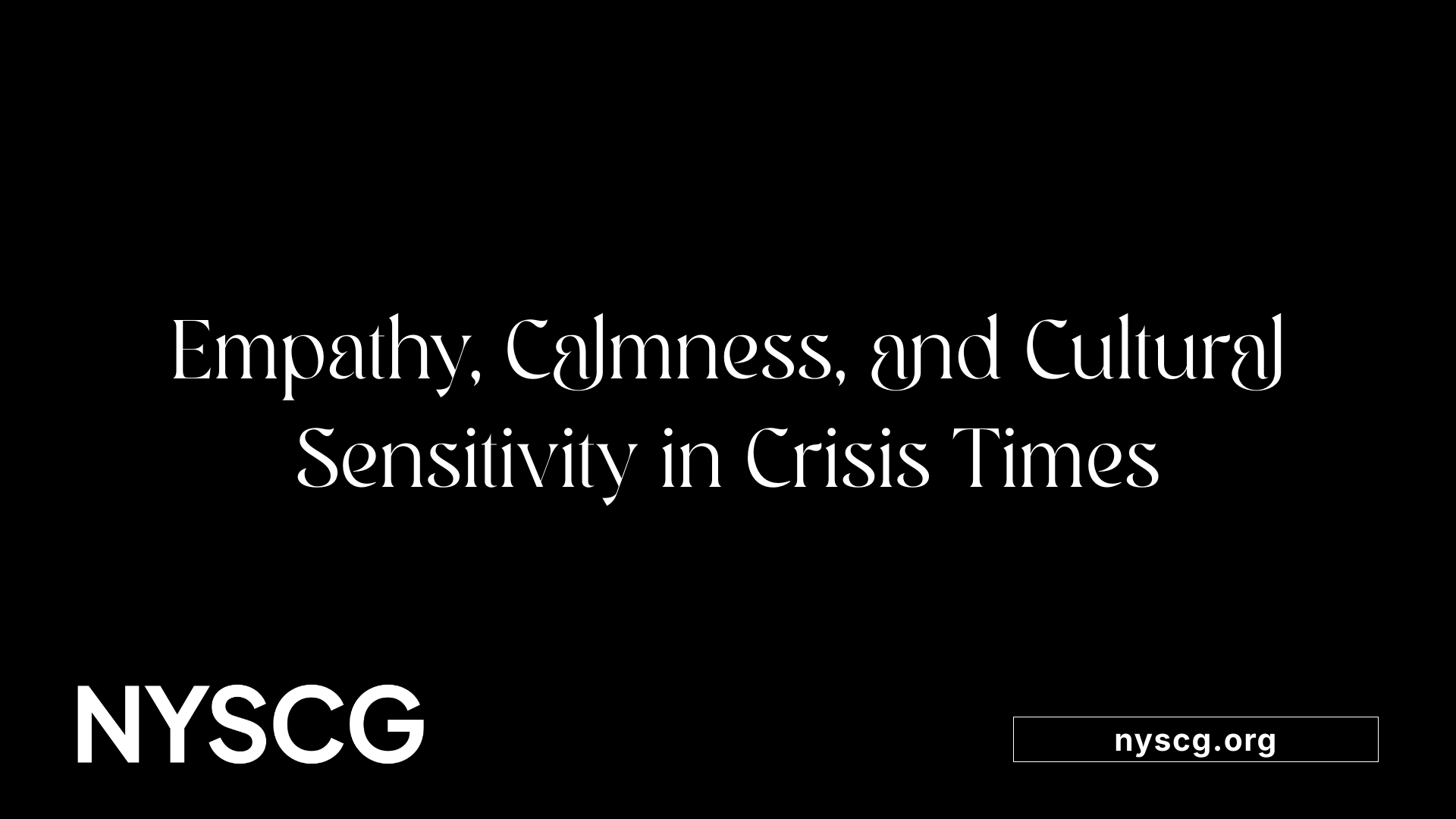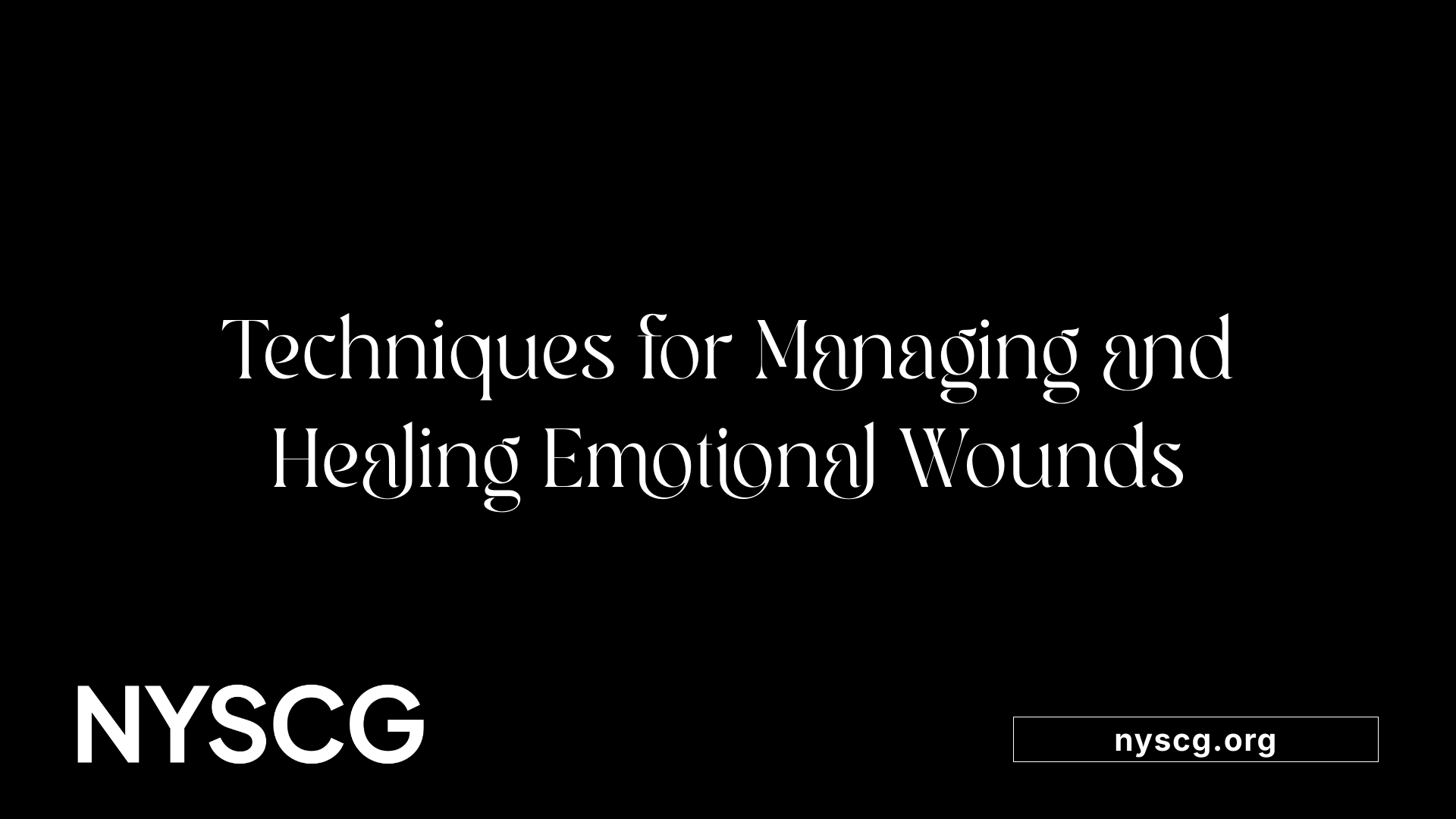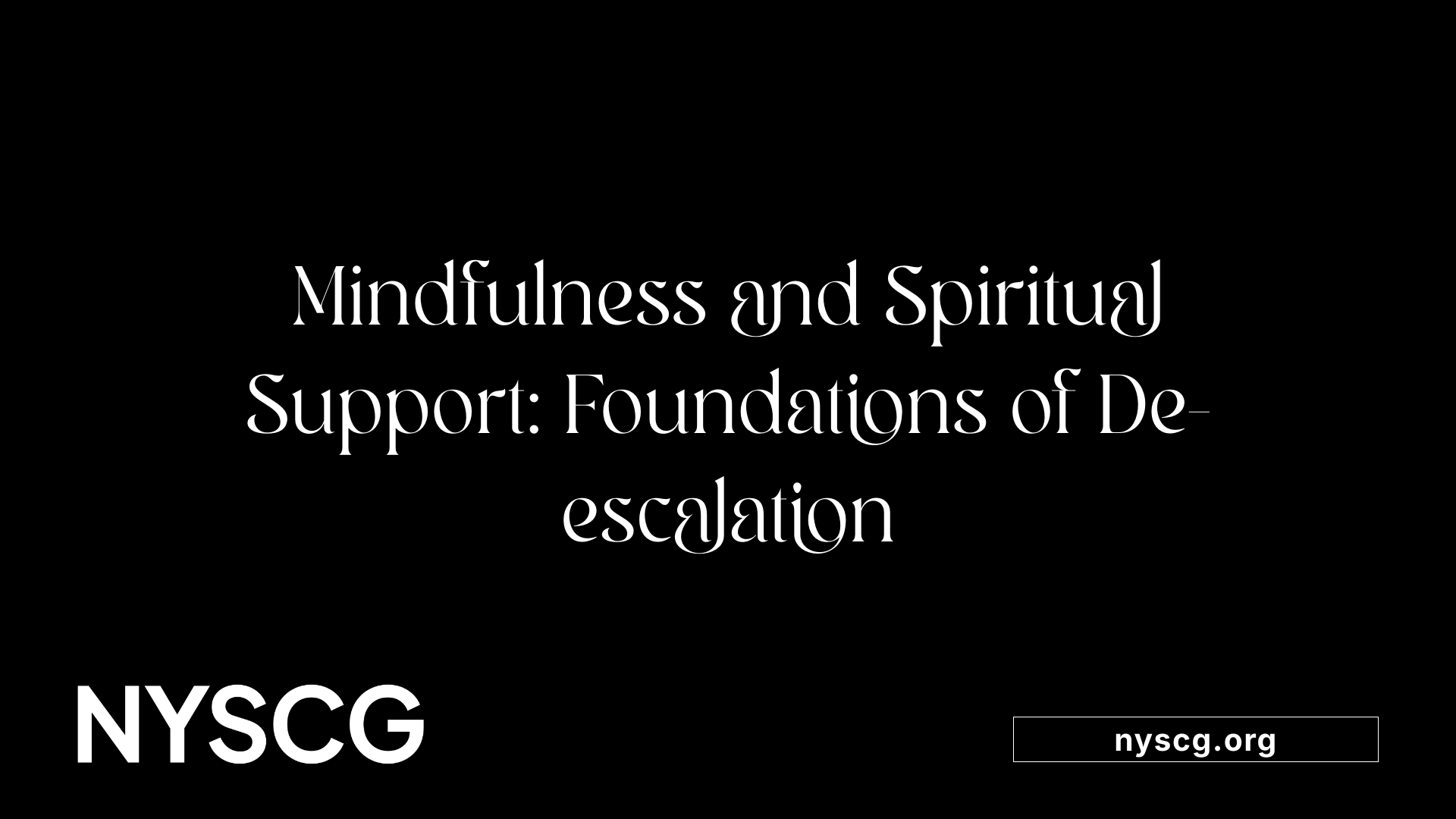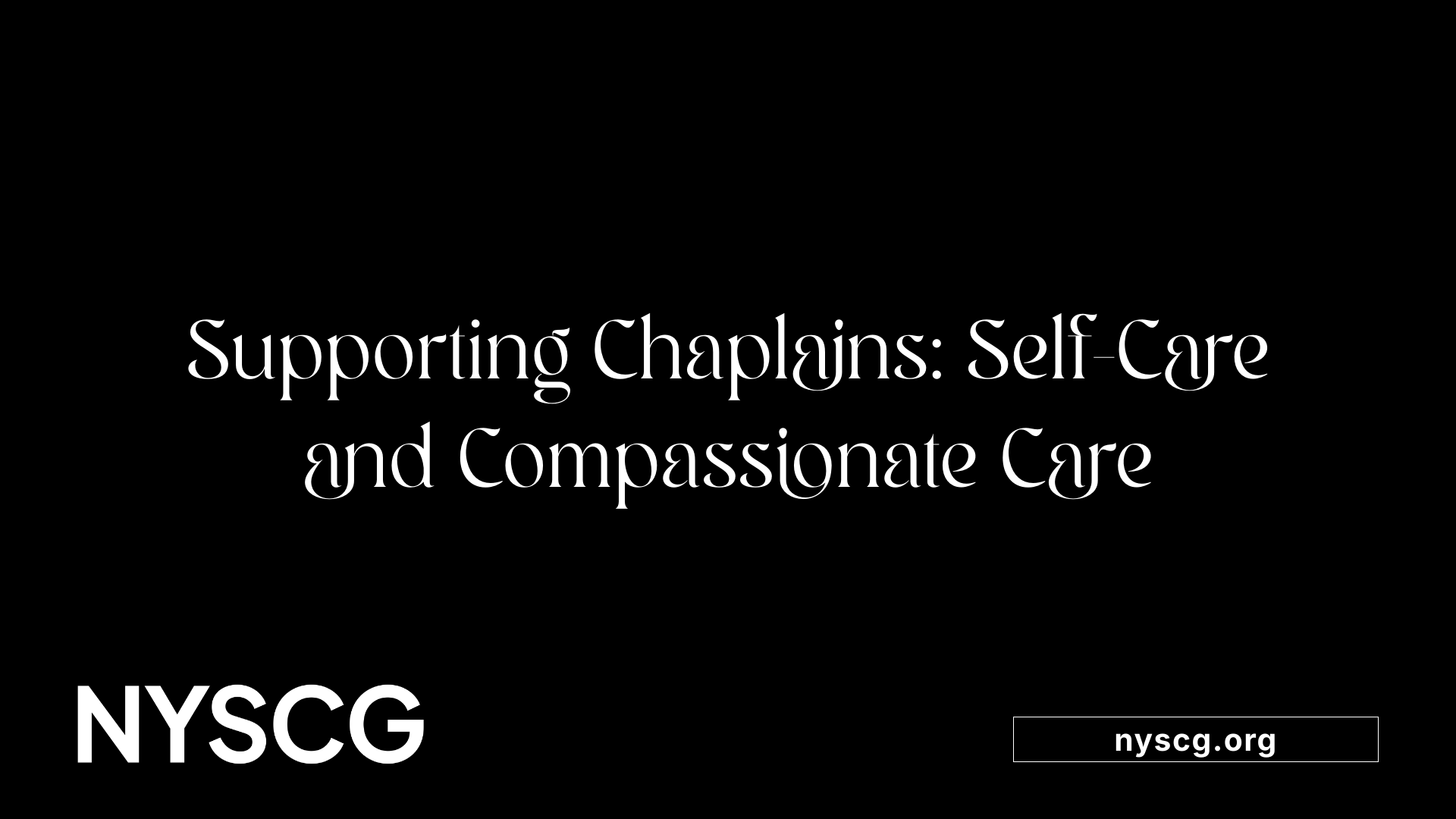Calming the Chaos: How Chaplains De-escalate Emotional Outbursts


Chaplains serve a vital role in some of the most emotionally charged environments, from hospitals to military zones. Their ability to de-escalate outbursts and provide spiritual and emotional support is both an art and a science, combining faith-based interventions with evidence-based strategies like mindfulness. This article explores the methods, strategies, and practices that enable chaplains to calm chaos and foster resilience amid crisis.

Chaplains employ a range of strategies to calm individuals during intense emotional episodes. A primary approach is active listening, where they attentively hear and validate the person's feelings without immediately offering solutions. This method helps individuals feel understood and heard, which can diffuse tension.
Empathy plays a central role in de-escalation. Chaplains strive to recognize and reflect back the emotions expressed, such as fear, grief, or anger. Showing genuine compassion reassures individuals and fosters trust.
Calming speech and body language significantly influence the de-escalation process. Chaplains use soft, steady tone of voice and maintain relaxed posture to create a safe environment. Eye contact and gentle gestures also signal attentiveness and calmness.
Understanding and respecting cultural considerations is essential. Different cultures have varying communication styles, such as direct or indirect approaches, which chaplains adapt to ensure their interventions are respectful and effective.
Building trust and establishing safety involve conveying respect, patience, and non-judgmental acceptance. Creating a sense of security encourages individuals to open up and reduces the likelihood of further agitation.
In practice, chaplains often combine verbal techniques—such as reassurance and problem-solving—with non-verbal cues like appropriate spacing, relaxed demeanor, and supportive gestures. These methods collectively help guide individuals toward emotional resolution.
Overall, by integrating empathy, cultural sensitivity, and calming communication, chaplains effectively de-escalate crises, fostering an environment of support and understanding.

Managing intense emotions during crises is vital for effective response and personal well-being. Several approaches work together to help individuals stay grounded and composed.
First, maintaining a calm and empathetic presence is crucial. When interacting with someone in distress, showing genuine care and patience can de-escalate tension. Chaplains and caregivers often draw from their faith and training to offer reassurance that validates feelings and fosters trust.
Grounding techniques are highly effective tools. Deep breathing exercises, such as inhaling slowly through the nose and exhaling through the mouth, help reduce physiological stress responses. Sensory awareness strategies—focusing on sights, sounds, or tactile sensations—can anchor a person in the present moment, helping to diminish overwhelming emotions.
Mindfulness practices like meditation and visualization are also powerful. Regular practice helps build resilience, enabling individuals to respond more thoughtfully rather than react impulsively. Mindfulness encourages observing thoughts and feelings without judgment, creating space for calmness.
Validating and normalizing feelings is another key component. Recognizing that anger, fear, and grief are natural responses, especially during traumatic events, reassures individuals they are not alone in their experiences. Clear, calm communication, setting boundaries, and providing consistent information reduce confusion and foster a sense of safety.
Radical acceptance—acknowledging circumstances that cannot be changed—reduces futile resistance and unnecessary suffering. Focusing on controllable factors, such as emotional responses and support actions, empowers individuals to navigate their reactions more effectively.
Supporting healthy lifestyle habits is often overlooked but essential. Encouraging restful sleep, physical activity, and social connection—even through digital means—builds overall resilience. These practices help sustain mental health, enabling better management of stress and emotional upheaval.
By combining these strategies—presence, grounding, mindfulness, validation, boundaries, acceptance, and lifestyle support—caregivers and individuals can create a comprehensive approach to calming emotional chaos during high-stress situations.

Managing anger and emotional trauma requires a multifaceted approach that addresses both physiological responses and thought patterns. One of the foundational techniques is deep breathing and relaxation skills. These practices help calm the body's stress response, reducing feelings of hostility and agitation in the moment.
Mindfulness practices are also central to emotional regulation. Regular mindfulness exercises, such as noticing your breath or body sensations, can improve awareness of emotional triggers and create space for thoughtful responses rather than impulsive reactions. Incorporating mindfulness helps individuals respond more calmly during stressful or crisis situations.
Cognitive restructuring and thought-challenging techniques involve identifying negative or distorted beliefs that fuel anger. By consciously challenging these thoughts, individuals can alter their perception of a situation, reducing hostility and promoting a balanced outlook. These approaches, often part of cognitive-behavioral therapy, help reshape reactions over time.
Physical activities, such as regular exercise, are effective stress relievers and can decrease impulsivity and aggression. Taking timeouts during intense moments to engage in brief physical activity or relaxation can prevent escalation. Complementary strategies include practicing effective communication skills to de-escalate conflicts and assertively express feelings.
Building strong support systems is vital for emotional healing. Seeking help through counseling or peer support groups creates a safe environment for processing emotions. Practicing forgiveness and empathy—both toward others and oneself—can foster understanding, reduce resentment, and promote healing.
Finally, developing a personal anger management plan tailored to individual triggers and circumstances is crucial. This plan may include steps like recognizing early warning signs of emotional overwhelm, employing calming techniques, and setting healthy boundaries. Combining these strategies with ongoing self-care and awareness helps maintain emotional resilience and recover from trauma.
| Technique | Description | Additional Notes |
|---|---|---|
| Deep breathing and relaxation | Calms physiological stress responses | Effective in immediate crisis situations |
| Mindfulness practices | Enhances emotional awareness and control | Regular practice improves response to triggers |
| Cognitive restructuring | Challenges negative thoughts | Reduces hostility, promotes positive thinking |
| Physical activity | Reduces impulsivity and stress | Includes exercise, stretching, or brief movement |
| Support systems | Emotional and professional support | Counseling, peer groups, family |
| Forgiveness and empathy | Promotes emotional healing | Reduces resentment and builds understanding |
| Personal anger management plan | Customized action steps | Tailored to individual triggers and needs |
Implementing these techniques consistently can significantly improve emotional regulation, helping individuals manage anger and trauma more effectively and fostering healthier interactions in crisis environments.

Mindfulness and spiritual care play a vital role in calming intense situations and preventing escalation. These approaches help both staff and individuals reduce emotional reactivity and foster a sense of calm and stability.
Training in mindfulness teaches present-moment awareness and acceptance without judgment. This skill enables caregivers and staff to stay centered and respond thoughtfully, even amidst chaos.
Spiritual care offers comfort, purpose, and psychosocial support. When individuals feel supported spiritually, they often experience increased resilience, which diminishes feelings of fear, anger, or grief that can escalate conflicts.
Research supports the effectiveness of these practices. For instance, a 2009 study by Singh et al. showed that a 12-week mindfulness program reduced the need for restraint and seclusion in a residential facility. Similarly, Sturgeon (2023) highlighted that mindfulness training decreased restraint use while improving staff-client interactions.
Such interventions also lead to better social participation, fewer aggressive behaviors, and more positive interactions. Staff trained in these techniques are better able to recognize triggers early, respond calmly, and reduce power struggles during tense moments.
Integrating mindfulness and spiritual care thus creates safer, more respectful environments. They help maintain dignity, foster mutual respect, and promote effective de-escalation across various human service settings.
| Aspect | Impact | Notes |
|---|---|---|
| Emotional regulation | Reduced stress and reactivity | Training in mindfulness enhances awareness of emotional triggers |
| Restraint reduction | Decreased use of physical interventions | Supported by multiple studies including Singh et al. (2009) |
| Staff-client interactions | Improved communication and social participation | Leads to more positive, supportive relationships |
| Power struggles | Fewer conflicts and less need for control | Mindfulness helps staff respond assertively and empathetically |
Incorporating these techniques fosters environments rooted in dignity and respect, ultimately supporting healthier interactions and safer communities.
 Chaplains play a vital role in supporting individuals during some of their most difficult moments. When emotional crises occur, whether in hospitals, military zones, or law enforcement settings, chaplains utilize spiritual care interventions to help those in distress. These include pastoral counseling, religious rituals, and fostering meaning-making practices that assist individuals in discovering hope and resilience amid their struggles.
Chaplains play a vital role in supporting individuals during some of their most difficult moments. When emotional crises occur, whether in hospitals, military zones, or law enforcement settings, chaplains utilize spiritual care interventions to help those in distress. These include pastoral counseling, religious rituals, and fostering meaning-making practices that assist individuals in discovering hope and resilience amid their struggles.
To enhance their effectiveness, chaplains often work closely with mental health professionals. This collaboration allows for an integrated approach, blending spiritual guidance with psychosocial support to address issues like trauma and moral injury. Such teamwork ensures a comprehensive response to complex emotional and psychological needs.
A critical aspect of their ministry involves active listening and creating safe environments where individuals feel comfortable expressing their feelings of loneliness, brokenness, and fear. By offering empathy and validation, chaplains help normalize emotional reactions, reducing stigma.
Stress management and burnout prevention are also central to supporting chaplains' own well-being. Techniques such as mindfulness, self-care practices, and peer support help chaplains maintain their emotional health so they can continue their ministry effectively.
Destigmatizing mental health issues is a key focus within chaplaincy work. Promoting awareness and understanding encourages those they serve—and themselves—to seek help when needed. Recognizing mental health challenges as part of the human experience fosters a more compassionate environment.
Moreover, chaplains actively support spiritual and emotional well-being by offering tools and strategies that help individuals cope with feelings of fear, grief, and despair. They often facilitate education around mental health, empowering individuals to take steps toward healing.
Research indicates that well-supported chaplains and integrated care models improve outcomes for those affected by trauma and distress. Their holistic approach, combining spiritual, emotional, and psychological support, creates a foundation for recovery and resilience.
| Aspect | Description | Additional Notes |
|---|---|---|
| Care Interventions | Pastoral counseling, rituals, meaning-making | Focuses on spiritual and emotional support |
| Collaboration | Working with mental health professionals | Enhances comprehensive care |
| Communication | Active listening, safe spaces | Builds trust and openness |
| Self-care | Mindfulness, stress reduction | Prevents burnout among chaplains |
| Destigmatization | Education, awareness campaigns | Encourages mental health acceptance |
| Overall Approach | Integrated spiritual and psychological support | Promotes holistic healing |
By adopting these strategies, chaplains continue to be resilient pillars, supporting others while maintaining their own emotional health in challenging environments.
Chaplains play a critical role in mediating emotional upheaval by combining faith-based care with evidence-based de-escalation techniques. Their ability to utilize mindfulness, empathetic communication, and spiritual support creates a foundation for emotional resilience, both for those in crisis and the caregivers themselves. A holistic approach that acknowledges mental health challenges, promotes stress reduction, and fosters hope ensures that individuals find a path toward healing. As frontline responders in emotionally charged environments, chaplains exemplify how compassionate presence and professional skill can transform chaos into calm, dignity into strength.
All you need is the will to make the world a better place.
New York State chaplain group inc. is a tax deductible organization with a federal tax Id number 92-383-4921